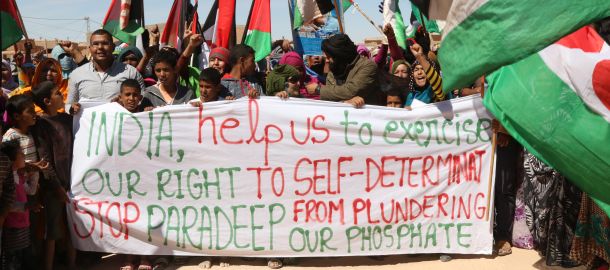
Over 200 million dollars worth of phosphate rock was shipped out of occupied Western Sahara last year, a new report from WSRW shows. For the first time, India is among the top importers.
For the fourth year in a row, Western Sahara Resource Watch publishes a detailed overview of the companies involved in the purchase of phosphates from occupied Western Sahara.
The illegally exploited phosphate rock is the Moroccan government’s main source of income from the territory it holds contrary to international law. Representatives of the Saharawi people have been consistently outspoken against the trade, both in the UN, generally, and to specific companies.
The list we present in this report is complete for the calendar year of 2016, naming all shipments of phosphates from occupied Western Sahara. This report attributes the purchases of Morocco’s production in Western Sahara in 2016 to eight identified, and one unknown, importing companies in eight countries internationally.
Download the report here (6 MB)
The report details the total exported volume from Western Sahara in 2016 at 1.86 million tonnes, with an estimated value of $213,7 million, shipped in 37 bulk vessels. That constitutes a slight increase in exports since 2015, after infrastructure failures for the exporter caused unusually low numbers in 2015. The largest importer in 2016 was Agrium Inc. from Canada.
Several clients internationally have abstained from the controversial imports over the last year. A remarkable development of 2016 was the entry into the game of a subsidiary of OCP in India. OCP exported a volume of 344,000 tonnes phosphate rock to its own company in India, at a value of $ 39,6 million. This made OCP’s Indian joint-venture the second largest importer of OCP’s own exports from Western Sahara. OCP is part-owning the joint-venture together with the Indian government.
Of the nine identified importing companies in 2016, three are registered on international stock exchanges or are majority owned by listed enterprises. All have been subject to blacklisting by ethically concerned investors because of this trade.
Of the remaining six companies, two are farmer owned cooperatives in New Zealand, two are fully or partially owned by the Government of Venezuela, one is partially owned by the Government of India, and one is privately owned.
Similar P for Plunder reports were also published in 2014, 2015 and 2016. WSRW calls on all companies involved in the trade to immediately halt all purchases of Western Sahara phosphates until a solution to the conflict has been found and the Saharawi people have been assured the exercise of their fundamental right to self-determination. Investors are requested to engage or divest unless companies commit clearly to withdrawing from the trade.
EU-Morocco Statement: autonomy without self-determination, law without lawfulness
A joint statement that came out of last week’s EU-Morocco Association Council asks readers to believe in a fiction: that an undefined autonomy plan imposed by an occupying power can satisfy the right to self-determination, and that respect for international law can coexist with the systematic ignoring of the EU’s own highest court.
Greenland Yes, Western Sahara No? The EU’s self-determination test
As the European Union rightly rallies behind Greenlanders’ right to decide their own future in the face of external pressure, a test of the EU’s real commitment to self-determination is quietly unfolding in Brussels.
The CJEU Court Cases
Keeping track of the many legal proceedings relating to Western Sahara is not easy. This page offers an overview of the cases concerning the territory that have been before the Court of Justice of the European Union (CJEU).
New report: Certified occupation
International certification standards embellish Morocco’s controversial trade with fisheries and agricultural products in occupied Western Sahara, new report documents.



